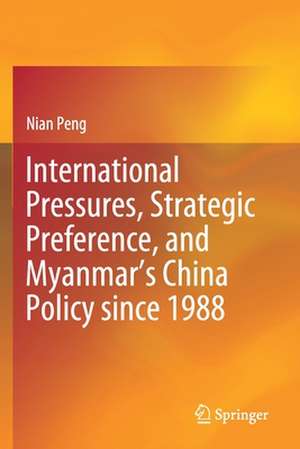International Pressures, Strategic Preference, and Myanmar’s China Policy since 1988
Autor Nian Pengen Limba Engleză Paperback – 10 sep 2021
The main content of this book is divided into seven parts, in which the first chapter introduces the background, the present study on Myanmar’s China policy and China’s Myanmar policy, the analytical framework, and the arrangement of the content. Chapter 2 focuses on the roots and changes of Myanmar’s competing strategic preference as well as its influences on Myanmar’s foreign policy. The following four chapters examine the international pressures and benefits imposed by systemic imperatives, and Burmese leaders’ specific strategic preference since 1988, and investigate Myanmar’s policy towards China in different periods. Finally, it provides a comprehensive conclusion that outlines and reviews the origins and evolution of Myanmar’s China policy, and predicts its future directions.
This book is suitable for the graduates and experts who are interested in international relations, the Asian studies and neo-classical realism in particular, and Myanmar politics and foreign relations, as well as China’s relation with neighboring countries.
| Toate formatele și edițiile | Preț | Express |
|---|---|---|
| Paperback (1) | 776.57 lei 6-8 săpt. | |
| Springer Nature Singapore – 10 sep 2021 | 776.57 lei 6-8 săpt. | |
| Hardback (1) | 782.57 lei 6-8 săpt. | |
| Springer Nature Singapore – 9 sep 2020 | 782.57 lei 6-8 săpt. |
Preț: 776.57 lei
Preț vechi: 947.04 lei
-18% Nou
Puncte Express: 1165
Preț estimativ în valută:
148.62€ • 154.58$ • 122.69£
148.62€ • 154.58$ • 122.69£
Carte tipărită la comandă
Livrare economică 15-29 aprilie
Preluare comenzi: 021 569.72.76
Specificații
ISBN-13: 9789811578182
ISBN-10: 9811578184
Ilustrații: XV, 183 p. 4 illus., 2 illus. in color.
Dimensiuni: 155 x 235 mm
Greutate: 0.29 kg
Ediția:1st ed. 2021
Editura: Springer Nature Singapore
Colecția Springer
Locul publicării:Singapore, Singapore
ISBN-10: 9811578184
Ilustrații: XV, 183 p. 4 illus., 2 illus. in color.
Dimensiuni: 155 x 235 mm
Greutate: 0.29 kg
Ediția:1st ed. 2021
Editura: Springer Nature Singapore
Colecția Springer
Locul publicării:Singapore, Singapore
Cuprins
Introduction.- Myanmar’s Contradictory Strategic Preference.- Swing to China:Myanmar’s China Policy (1988-2004).- Alienated from China: Myanmar’s China Policy (2005-2010).- Hedged against China: Myanmar’s China Policy (2011-2015).- Approached to China:Myanmar’s China Policy (2016-2020).
Notă biografică
Textul de pe ultima copertă
This book mainly explored the driving forces and evolvement of Myanmar’s China policy since 1988 by adopting a neo-classical realist apporach, an emerging theoretical paradigm aiming at analyzing state’s foreign behaviour by connecting systemic and unit variables which refers to external environments and domestic restraints respectively. It is the first book that seeks to give a theoretical explanation of Myanmar’s diplomacy, thereby bridging the gap from basic research to the deep one with theories. It also introduced the concept of strategic preference and argued that the competing strategic preference that the Burmese leaders have, namely “integration” and “isolation”, determines Myanmar’s responses to China in the Post-Cold War era, which not only demonstrates the neo-classical realism as an useful instrument of looking into state’s foreign policy and deepens the understanding on Myanmar-China relations.
The main content of this book is divided into seven parts, in which the first chapter introduces the background, the present study on Myanmar’s China policy and China’s Myanmar policy, the analytical framework, and the arrangement of the content. Chapter 2 focuses on the roots and changes of Myanmar’s competing strategic preference as well as its influences on Myanmar’s foreign policy. The following four chapters examine the international pressures and benefits imposed by systemic imperatives, and Burmese leaders’ specific strategic preference since 1988, and investigate Myanmar’s policy towards China in different periods. Finally, it provides a comprehensive conclusion that outlines and reviews the origins and evolution of Myanmar’s China policy, and predicts its future directions.
This book is suitable for the graduates and experts who are interested in international relations, the Asian studies and neo-classical realism in particular, and Myanmar politics and foreign relations, as well as China’s relation with neighboring countries.
Caracteristici
Gives a theoretical explanation of Myanmar’s China policy in the Post-Cold War era by adopting a neo-classical realist apporach Provides a comprehensive overview of the causes and changes in Myanmar’s China policy as well as Myanmar-China relations in different periods Predictes the future direction of Myanmar’s China policy
